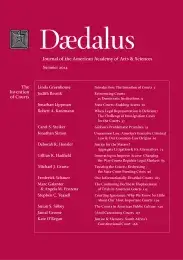State Courts: Enabling Access
In New York, millions of civil litigants each year fight for the necessities of life without the aid of a lawyer because they are unable to afford one. While the state courts strive to provide access to justice for all constituents, this ideal becomes a promise unfulfilled due to the lack of available civil legal services for low-income populations. In this essay, I discuss access to justice in the state courts from the perspective of my role as Chief Judge of the State of New York. I examine the enormity of the unmet need in New York and around the country and discuss the measures I have taken as head of the New York State court system to address the crisis. These efforts have resulted in a substantial increase in state funding for civil legal services, the establishment of the Task Force to Expand Access to Civil Legal Services in New York, annual hearings in each of New York's four Judicial Departments, and the development of programs designed to spur the legal community (including law students) to greater involvement in pro bono work.
Our courthouses lie at the very heart of our communities, in every sense. In the words of U.S. Supreme Court Justice Lewis Powell, “For much of our history, the courthouse has served not just as a local center of the law and government but as a meeting ground, cultural hub, and social gathering place.”1 The courthouse, above all other public spaces, embodies our most deeply held common values: our commitment to fairness, due process, and equal justice for all. In this way, the courts are the institutions that protect our individual rights and liberties and preserve the rule of law.
Access to justice is fundamental to all democratic societies, and it is a bedrock principle of our nation. The World Justice Project describes it as
the ability of all people to seek and obtain effective remedies through accessible, affordable, impartial, efficient, effective, and culturally competent institutions of justice. Well-functioning dispute resolution systems en - able people to protect their rights against infringement by others, including powerful parties and the state.2
That principle is ingrained in the Constitution of the United States, and delivering equal justice to all . . .
